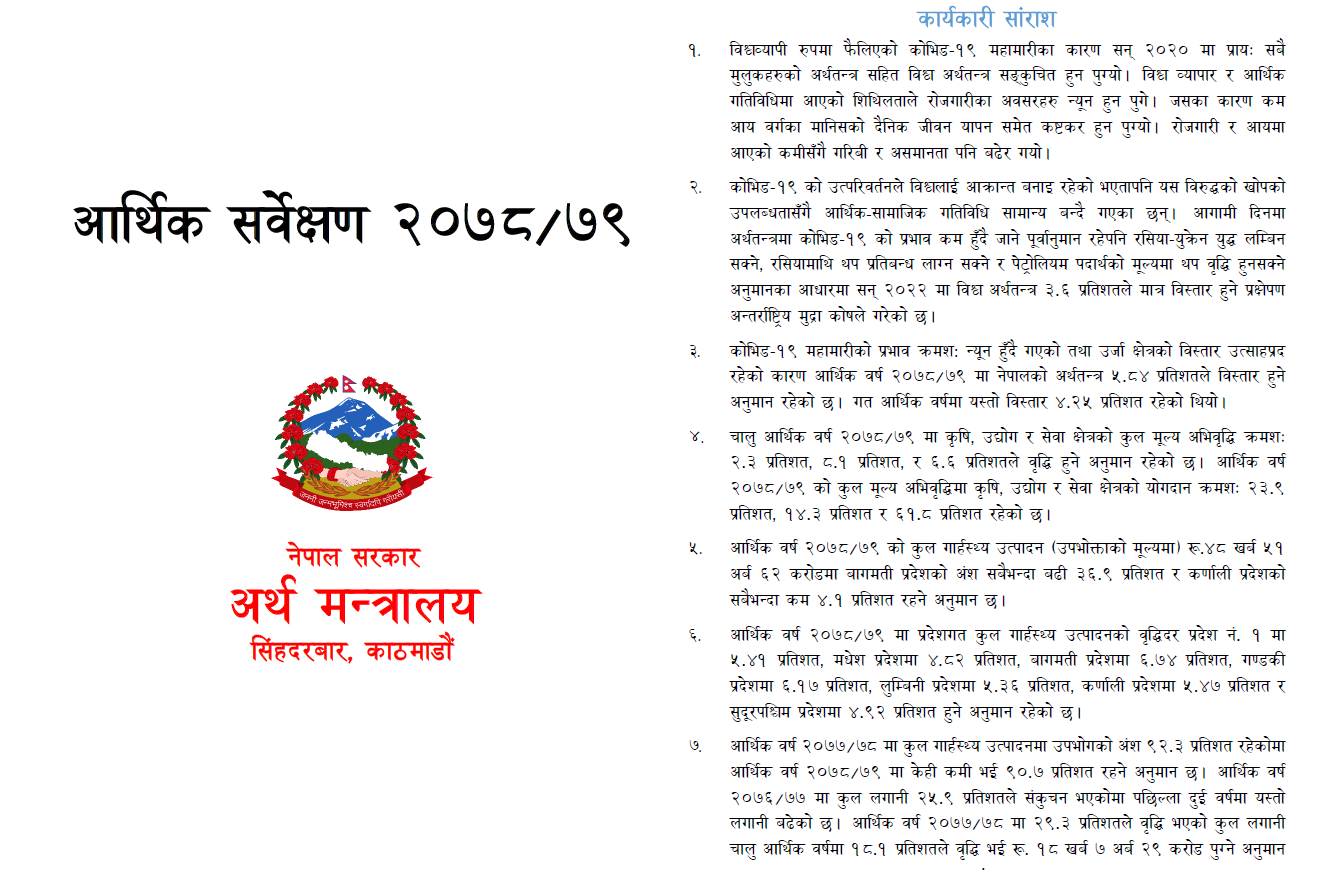
Nepal's economy is projected to expand by 5.84 percent in the current fiscal year. Such expansion was 4.25 percent in the last fiscal year. According to the Economic Survey 2078/79 presented by the government in the Parliament today, the impact of the Covid-19 epidemic has been gradually diminishing and the expansion of the energy sector has been encouraging due to the expansion of Nepal's economy.



The global economy, including the economies of almost all countries, will shrink by 2020 due to the Covid-19 epidemic. The slowdown in economic activity has reduced employment opportunities. Due to this the daily life of the low-income people has become difficult. Along with the decrease in employment and income, poverty and inequality have also increased.
Although the mutation of Covid-19 is affecting the world, socio-economic activity is becoming more common with the availability of vaccines against it. The International Monetary Fund (IMF) has projected that the global economy will expand by only 3.6 percent in 2022, given the effects of Covid-19 on the economy in the coming days. Has done
In the current Fiscal Year 2078/79, the total value added of the agriculture, industry, and services sectors are estimated to increase by 2.3 percent, 8.1 percent, and 6.6 percent respectively. The contribution of agriculture, industry and service sector to the total value added of FY 2078/79 has been 23.9 percent, 14.3 percent, and 61.8 percent respectively.
The gross domestic product (in consumer prices) of FY 2078/79 stood at Rs. 485.162 billion; Bagmati has the highest share at 36.9 percent and Karnali has the lowest at 4.1 percent.
In the Fiscal Year 2078/79, the GDP growth rate was 5.41 percent in Province No. 1, 4.82 percent in Madhes, 6.74 percent in Bagmati, 6.17 percent in Gandaki, 5.36 percent in Lumbini and 5 percent in Karnali. It is estimated to be 47 percent and 4.92 percent in the Sudurpashchim Pradesh.
The share of consumption in the GDP was 92.3 percent in FY 2077/78 but it is estimated to be 90.7 percent in FY 2078/79. Total investment has shrunk by 25.9 percent in FY 2076/77 but has increased in the last two years.
Total investment, which increased by 29.3 percent in FY 2077/78, is projected to increase by 18.1 percent to Rs 187.29 billion in the current Fiscal Year. The economic survey estimates that the ratio of total investment to production will increase from 34.8 percent to 37.3 percent in FY 2078/79.
In FY 2078/79, the per capita GDP of current prices is estimated to increase by 12.3 percent and reach Rs. 164,598. In FY 2077/78, such per capita GDP was Rs. 146,521.
Rising prices of petroleum products, rising transportation costs, rising prices of food and imported raw materials and other goods and services have weighed on inflation, the survey said.
The average consumer price inflation stood at 5.4 percent in FY 2078/79. Such inflation was 3.5 percent in the corresponding period of the previous year.
In FY 2077/78, the consolidated expenditure at the federal, Province, and local levels increased by 14.4 percent and reached Rs. 1362.18 billion. In the Fiscal Year 2077/78, the share of recurrent expenditure, capital expenditure and expenditure on financial management in the total consolidated expenditure was 54.4 percent, 36.5 percent and 9.1 percent respectively. In FY 2076/77, such share was at least 56 percent, 34.1 percent and 9.9 percent.
As of February / February of the current Fiscal Year, the Federal Revenue has increased by 19.6 percent as compared to the corresponding period of the previous Fiscal Year and reached Rs. 6.57 billion. Federal expenditure increased by 180 percent to Rs. 674.61 billion.
By the end of the Fiscal Year 2078/79, the budget deficit of the Federal Government was Rs. 21.31 billion. Such deficit was Rs. 29.26 billion in the corresponding period of the previous year.





